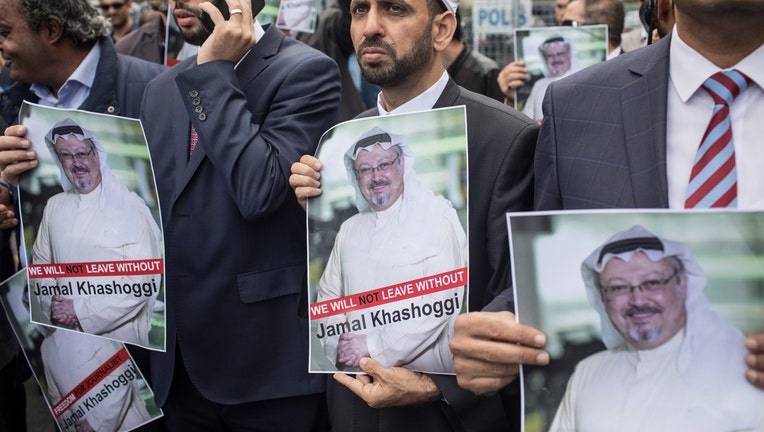Senate passes resolution saying Saudi Crown Prince bin Salman responsible for Jamal Khashoggi death

WASHINGTON (AP) - Senators voted Thursday to recommend that the U.S. end its assistance to Saudi Arabia for the war in Yemen and put the blame for the death of journalist Jamal Khashoggi squarely on Saudi Crown Prince Mohammed bin Salman, in a direct challenge to both the longtime Middle East ally and President Donald Trump's handling of the relationship.
The succession of bipartisan votes came two months after the Saudi journalist's slaying at the Saudi consulate in Istanbul and after Trump persistently equivocated over who was responsible. U.S. intelligence officials concluded that bin Salman must have at least known of the plot, but Trump has repeatedly praised the kingdom.
Senators made clear where they put the blame. The resolution, passed by unanimous agreement, says the Senate believes the crown prince is "responsible for the murder" and calls for the Saudi Arabian government to "ensure appropriate accountability."
Senators voted 56-41 to recommend that the U.S. stop supporting the war in Yemen, a direct affront to the administration's war powers abilities.
The floor action brought an unusual show of bipartisan resolve in the Senate over U.S foreign policy, even amid an uncertain outcome as the measures move to the House.
Frustration with the crown prince and the White House prompted several Republicans to support the Yemen resolution as a way to rebuke the longtime ally. Seven Republicans and all Democrats voted for it. Some already had concerns about the war, which human rights groups say is wreaking havoc on the country and subjecting civilians, many of them children, to deadly disease and indiscriminate bombing.
Independent Sen. Bernie Sanders of Vermont, who co-sponsored the Yemen resolution with Republican Sen. Mike Lee of Utah, called the vote a "historic moment."
Lee said Khashoggi's death focused attention "on the fact that we have been led into this civil war in Yemen half a world away" and "we've done so following the lead" of Saudi Arabia.
"What the Khashoggi event did was to demonstrate, hey, maybe this isn't a regime that we should just be following that eagerly into battle," Lee said.
The resolution condemning Saudi Arabia for Khashoggi's slaying was introduced by Senate Foreign Relations Chairman Bob Corker and Senate Majority Leader Mitch McConnell. Both Republicans opposed the Yemen resolution and voted against it.
McConnell said senators have grave concerns about Khashoggi's killing, but "we also want to preserve a 70-year partnership between the United States and Saudi Arabia, and we want to ensure it continues to serve American interests and stabilizes a dangerous and critical region."
But McConnell urged colleagues to back the resolution on Khashoggi's death. Its passage, he said, provided "a clear and unambiguous message about how we feel about what happened to this journalist."
The resolution also calls the war in Yemen a "humanitarian crisis" and demands that all parties seek an immediate cease-fire.
It appears unlikely that the House would be willing to consider the Yemen resolution. House leaders added a provision to an unrelated House rule that would make it more difficult for lawmakers there to call it up.
CIA Director Gina Haspel briefed House leaders on the Khashoggi slaying on Wednesday, and Secretary of State Mike Pompeo and Defense Secretary Jim Mattis briefed the full House on Thursday.
Pompeo and Mattis briefed the Senate last month and told senators there was "no direct reporting" or "smoking gun" to connect the crown prince to Khashoggi's death at the Saudi consulate. But a smaller group of senators leaving a separate briefing with Haspel days later said there was "zero chance" the crown prince wasn't involved.
House Republicans were less eager than their Senate counterparts to criticize Saudi Arabia and the Trump administration. House Majority Whip Steve Scalise, R-La., said after Thursday's briefing that he was waiting to see the outcome of the administration's ongoing investigation.
Scalise said there had been "discussions" about action before the end of the year but wouldn't say if GOP leaders would consider Corker's resolution.
Khashoggi, who had lived in the U.S. and wrote for The Washington Post, had been critical of the Saudi regime. He was killed in what U.S. officials have described as an elaborate plot as he visited the consulate for marriage paperwork.
Saudi prosecutors have said a 15-man team sent to Istanbul killed Khashoggi with tranquilizers and then dismembered his body, which has not been found. Those findings came after Saudi authorities spent weeks denying Khashoggi had been killed in the consulate.
Pressed on a response to the slaying, Trump has been reluctant to condemn the crown prince. He said the United States "intends to remain a steadfast partner" of the country, touted Saudi arms deals worth billions of dollars to the U.S. and thanked the Saudis for plunging oil prices.
The Senate debate came as the United Nations secretary general on Thursday announced that Yemen's warring sides have agreed to a province-wide cease-fire and withdrawal of troops in Hodeida, a contested Red Sea port city. The agreement came during peace talks in Sweden.
The brutal four-year-old civil war pits the internationally recognized Yemeni government, supported by a Saudi-led coalition, against the Iran-backed rebels known as Houthis.
Sen. Todd Young, R-Ind., who voted for the Yemen resolution, said he's "absolutely convinced" the Senate's action is applying pressure on the Saudis. He said that without it "there's a real possibility that there wouldn't be negotiations going on right now in Sweden."
Associated Press writer Laurie Kellman in Washington contributed to this report.

